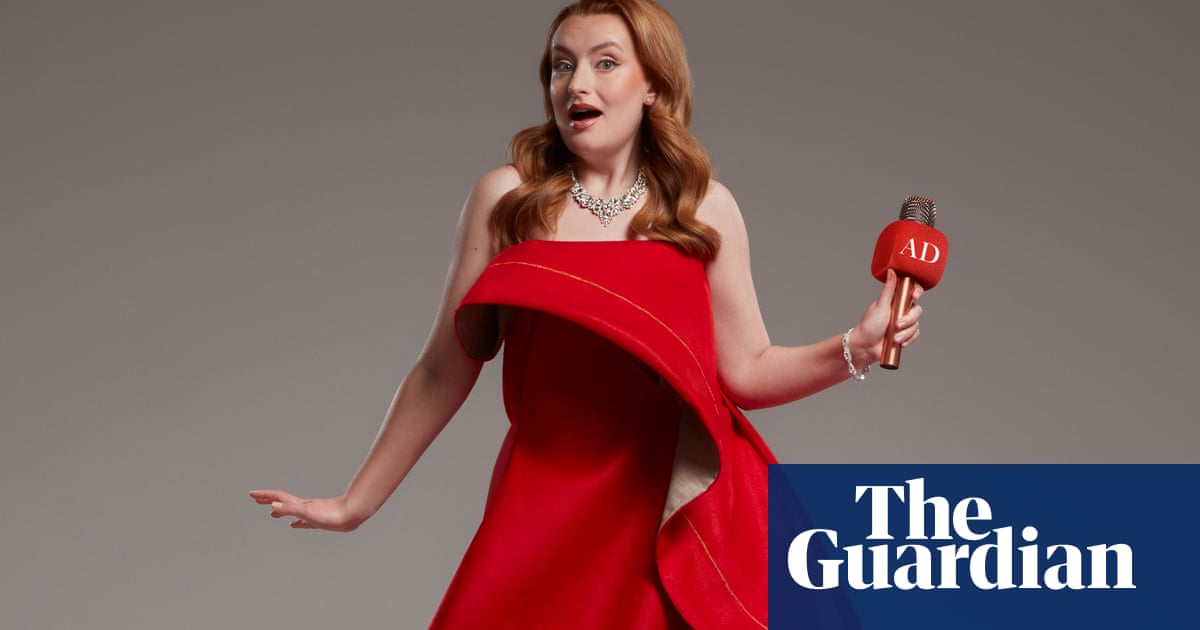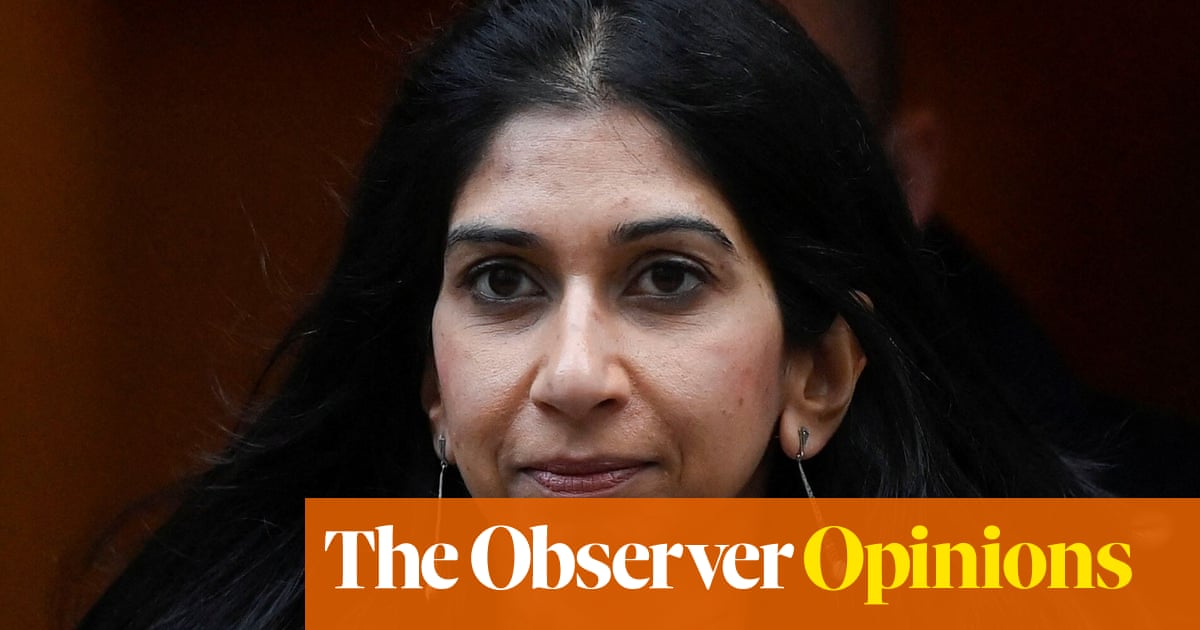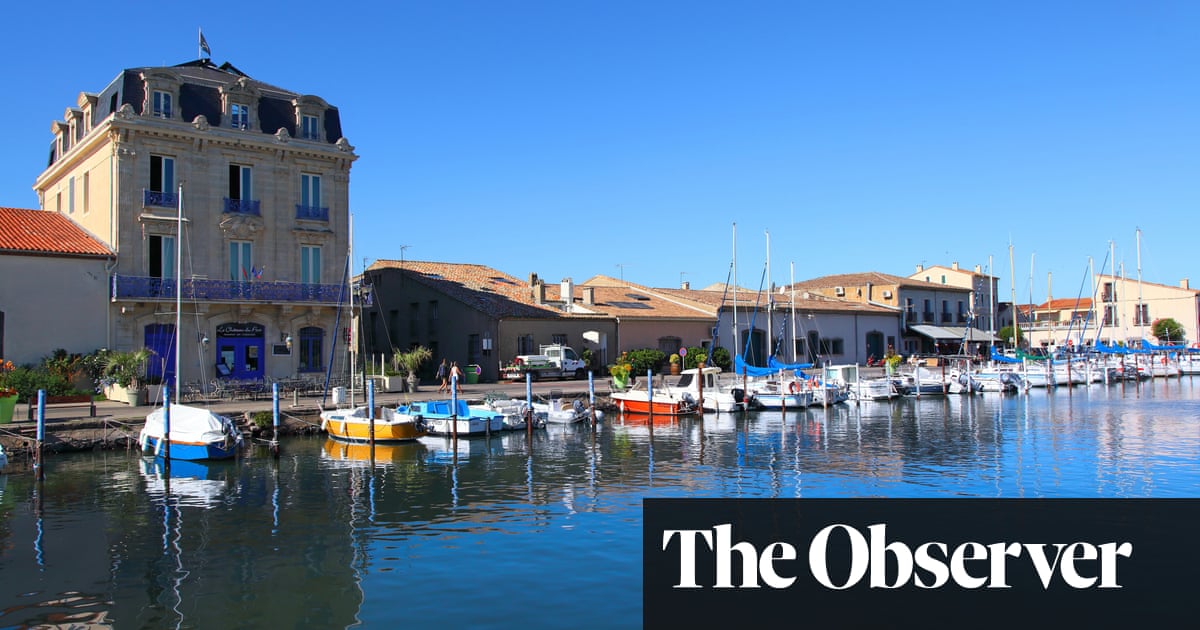
“You’re about to get on to the red carpet for one of the most exclusive awards ceremonies of the year!” a voice booms. “It’s showtime!” It looks more like Amelia Dimoldenberg and I are walking down a dark corridor; this isn’t Hollywood, but London’s Madame Tussauds. “Is that a real person?” she jumps as we pass a plastic paparazzo. Then a human photographer fawns over us as if we were real stars. Except … “Oh my goodness, it’s you!” he giggles, overcome. Is this still a bit? Or has the presence of an actual celeb melted Madame’s waxy fourth wall?
It’s the latter. He wants a photo – but his camera is fake and he has no phone. “How would you take it then?!” says Dimoldenberg, bemused. At least the fake photographer gets to experience her trademark sharp-shooting. As host of the comedy interview series Chicken Shop Date (CSD), Dimoldenberg takes celebrities out for nuggets, purportedly on her quest for true love, although her exaggerated awkwardness doesn’t exactly make for traditional romance. “So, how do you sext?” she asks Ed Sheeran in one episode. (“Wow. In person.”) To rapper Fuse ODG: “Did you have dreams of being an electrician?” And, infamously, “Can you remember any of the rap that you did?” to Louis Theroux. He did, spawning last year’s best meme by reciting the “My money don’t jiggle jiggle / It folds” rap from Weird Weekends. (The Theroux episode of CSD has now been viewed 11m times.) “As someone who’s always been so interested in pop culture, to be part of a big pop culture moment like that was really amazing,” says Dimoldenberg.
It wasn’t a one-off. More recently, Dimoldenberg, 29, has been hosting the red carpet at glitzy awards parties (including the Vanity Fair bash at the Oscars) as legacy brands lunge for her ability to mint weird viral gold. At the 2022 GQ man of the year awards, Andrew Garfield declared his fandom. She praised his armpits. He admired the “rubbery ropes” of her complicated dress and said he’d do CSD. Their nervy oneupmanship indicated undeniable chemistry, titillating Twitter. They met again at the Golden Globes in January and only grew more flustered. “I’m scared of what it could turn into,” said Garfield. It was all anyone remembered about the ceremony. Nora Ephron couldn’t have written it better.
As we enter the “awards party room” at Tussauds, Dimoldenberg, in black biker jacket and jumpsuit, compares our entrance to reality. “The red carpet is the most overwhelming place,” she says, leaning in as we try not to topple Priyanka Chopra Jonas. “There’s so many eyes on you. You’re meant to be the most perfect version of yourself. And you’re around the most beautiful, successful people so you can’t help but compare yourself.” It is worse in the photographers’ pen, she says. Mostly they don’t know who she is and want her to budge for Jennifer Coolidge. If there’s a sign with her name on to tell them who she is, it’s often misspelt. But, tellingly, Dimoldenberg’s name, or thereabouts, is on the signs. “Most people interviewing the talent are not also going to get their photo taken,” she says hesitantly. “So I’m in kind of a different bracket.”
We encounter an alternate reality in which a waxwork Steven Spielberg is directing a bulbous, sauntering Shrek. “He was coming out of the Vanity Fair Oscars party as I was going in,” says Dimoldenberg. (Spielberg, not Shrek.) Surrounded by celebs, she felt anonymous until the actors Sophie Turner and Zoey Deutch recognised her. But at home, Dimoldenberg is becoming better known than some of her dates, turning the melamine-coated tables on her show’s premise.
Chicken Shop Date thrives on incongruity: why would a celebrity meet some random girl for chips? Dimoldenberg started it as a column interviewing rappers in a youth club magazine and in 2014 pivoted to YouTube. “The dynamic is that no one really wanted to be there,” she says. Her first hit was People Just Do Nothing’s Asim Chaudhry, in character as foul-mouthed wannabe mogul Chabuddy G. He almost made her corpse, although usually she can poker-face for Britain, whether telling Maya Jama she’d never heard of her then boyfriend, an MC called Mike (ie Stormzy) or serenading Dave on a toy piano. The thought of dropping the mask keeps Dimoldenberg awake at night, she says, “but I’ve made it part of my shtick. People think I’m being awkward but actually I’ve just forgotten where I’m at so I’ll ask: ‘What’s your favourite colour?’ and they’re like: ‘You’re so funny!’”
The real Dimoldenberg is hyper-aware and direct – a successor to Paula Yates, Ruby Wax and Popworld-era Simon Amstell – and her facade conceals deep research. There’s a lot at stake for her guests. “You can’t sleepwalk through it, it’s not promo,” says Apple Music presenter and CSD fan Zane Lowe. “You’re talking to someone who sees past the veneer of the entertainment business so you can’t phone it in.”
Especially men: Dimoldenberg subverts the cliche of the sleazy male chatshow host, leaving guys to parry her disconcerting advances without overstepping. “It’s quite bad, I never think about their nerves,” she admits. “I’m too wrapped up in mine.” Some try to outfox her: the 1975’s Matty Healy goaded her to kiss him (she pecked his forehead). Ed Sheeran told viewers: “She’s actually a very lovely person.” But Dimoldenberg gets the final say with a razor-sharp, sub-seven-minute edit. She found Sheeran’s comment funny, so kept it in. “Awkwardness is part of life but it’s edited out of what we consume.”
She has a confession. “I would never go on CSD.” What? “It’s too intense! What if people think you’re not good at flirting?” Yet the calibre of celebrities keen to share a boneless box keeps growing: Rosalía, Jack Harlow, England’s Lionesses. These days, stars want to prove that they’re a good hang – hence the parallel popularity of offbeat celebrity podcasts such as How Long Gone and Off Menu – and PRs are desperate to fling their clients into Dimoldenberg’s deep fat fryer. “At a talent meeting yesterday, I turned down everyone apart from one,” she says (but keeps stumm on who).
Ultimately, she wants to flatter her dates. They get courtesy edit approval; only footballers have flinched. “A player’s team asked to take out all references to flirting,” she says. “My blood was boiling!” Louis Theroux complimented her for revealing a philosophical side of rapper Central Cee. (He calls love “a delusion” as she looks worried.) “I make an effort to show the actual person, not the constructed person in their music videos,” she says. In an era of filters and heavy image management, CSD reminds you how little it takes – just ketchup and strip lighting – to reveal something unexpected and human.
As she struggled for budget – she pays the chicken shops to shut and hires security – Dimoldenberg tried to sell. Channel 4 declined. BBC Three wanted the copyright, so she declined. “Then a big media company wanted to buy the rights for £500,” she gawps. “And I said no. I’m so happy I said no to all these things.” It stayed on her YouTube channel, she started a production company and began profiting from views; got management, and recently, a starry US agent.
Late last year, management rang. Dimoldenberg panicked, assuming she’d been cancelled. It was the Golden Globes. She got to work, prepping questions for every nominee, presenter and guest, flipping “nitty gritty facts” sent by their researchers into her tone of voice. She shows me her mile-long Google doc of prep. “I don’t like showing my process, it cringes me out. But I’m overthinking it, as usual.” On the red carpet, she had a “mountain of cue cards”, ready for anyone. She wanted big names: “I was like, I’m gonna get Rihanna.” But many A-listers breezed past. She still danced with Henry Winkler and got Guillermo del Toro to rub her lucky egg. Nevertheless: “I ended up leaving the carpet really disappointed.”
Watching the rushes, she felt marginally better. “Especially the Andrew Garfield one.” For him she only prepped one question, which she garbled three times (“You have an affinity to [not for] playing religious characters”) as he howled with laughter: “Are you actually going to ask a serious question? … That’s not even a question!”
“I knew it would be a vibe,” she says confidently. “It shows that you can get one really amazing interview and that’s all that matters.”
The Oscars provided the year’s other viral red carpet moment, the model Ashley Graham’s excruciating Hugh Grant interview. Watching live from her hotel, Dimoldenberg knew how she would have played it. “Seemingly he didn’t want to do the interview, or didn’t see the big fuss about the Oscars even though he’d agreed to give out an award,” she laughs. “So I would just say that: ‘Well, why are you here then?!’ Often what I do feels like stating the obvious, but I think people aren’t used to that. Or maybe my obvious isn’t everyone else’s obvious.”
Dimoldenberg’s aim is “to make something that doesn’t feel like something you’ve seen before”. She set her bar high at primary school, just down the road from Madame Tussauds. She grew up in Marylebone, central London; mum a librarian, dad a PR executive and Labour councillor. She was neither gifted nor hopeless, but an extreme striver of the mid-tier. “It’s probably just wanting to impress my parents,” she says. “I wanted to show them: I got chosen to do this.” (She got “a prize for effort in every year”, says mum Linda Hardman.)
Dimoldenberg was gutted she was too young for S Club Juniors and dragged her mum to Oxford to audition for the film adaptation of The Golden Compass despite not having read it. (She did manage to bag a Newsround Press Pack reporter gig.) “I always felt special and happy when I was doing those things,” she says. “Maybe that’s still what I’m doing now.” Determined to become editor of Vogue, at 17 she joined a youth club that ran its own magazine. She liked pop but everyone else liked grime, and she wanted to understand it. CSD was born, which Dimoldenberg continued on YouTube when she went to study at Central Saint Martins.
These origins have prompted periodic criticism about optics – a white woman interviewing Black men in chicken shops – and media gatekeeping. While Dimoldenberg doesn’t think people have a problem with the former, she’s alert to the latter. “There is an issue with access within the media,” she says. “There’s a need for more diversity and access.” At the same time, she says, her show is DIY: she wasn’t anointed by powerful execs. “If you remove CSD from the equation, the problem is not solved.”
Unfortunately we’re mid-conversation when Madame Tussauds’ routing leaves us no choice but to strap into a ride touring waxy scenes from Ye Olde England. “It’s a systemic problem,” continues Dimoldenberg, as Shakespeare scribbles away. She never films with all-white crews and fundraises for arts access and youth services charities; her old youth club has gone: “That wasn’t necessarily needed for me, but for people from disadvantaged backgrounds that was really crucial.” Watch a lot of CSD and you notice that scenes of guests celebrating these spaces survive her edit. “There should be more things like that to level the playing field,” she shouts, as we’re forced to recline and watch marionettes frolic in the Great Fire of London.
Although major stars now hanker for a CSD, Dimoldenberg will “never not be interviewing rappers”, she says, after we escape the puppet hellfire. She laughs. “My type will always probably be that.” She intends to end the show with Drake, who has promised to do it. Handily, he is Madame Tussauds’ newest superstar. “Oh my God,” says Dimoldenberg as we meet his suggestive stare. “He looked exactly like that when I met him.” (Very, very smooth.) She gets a selfie. “If I posted this, people would think it was real,” she says. They met at Wireless 2018; Covid scuppered a planned CSD shoot in 2020. “I think what’ll happen is he’ll message and say: ‘I’m in London, let’s do it tomorrow.’ I’ve got everything ready, even handmade props.”
She is ready for CSD to end: “It’s so much of my identity.” Plus, she thinks it interferes with her love life. “Maybe because I have a dating show, guys don’t take me seriously. Or they have a preconceived idea of what it would be like to go on a date with ‘Amelia’?” Her success has previously intimidated men: “I want to meet someone where I can say: ‘I’m about to interview Drake,’ and not feel it’s bruised their ego.”
Has the show’s newfound starriness also changed its essence? Surely things are different when Shania Twain is throwing nuggets into your mouth in Chicken Cottage? Dimoldenberg disagrees. It retains its integrity because “I’m in control”, she says. She doesn’t feel her new fame affects it. “If anything, I’ve just become more confident.”
While she defines herself as an interviewer and dreams of her own chatshow, her next goal is TV writing. She’s awaiting notes on her first draft for a script about teenage hedonism, though her ambitions feel looser now to when she was younger. “I feel like I’ve been trapped by my own brain,” she explains. “Like I’ve had such pressure to achieve something that now I’ve done it, I’m free from the plan I created for myself.”
She wants her next project to feel true to her voice; watching CSD now, it doesn’t feel like her. The Andrew Garfield moment showed her that “my true personality is also interesting”, she says. “Before I thought, people like my deadpan side, so let’s stick to that. I’m realising that me is good enough.” Almost, anyway. As Rihanna songs blast and reality feels a distant memory, I’m forced to ask … Amelia, what’s your favourite colour? “Maybe lilac? I was going to say black.” She pats her outfit. “I wear a lot of colour but I always wish I was more chic and Parisian.”
We behold Little Mix and a couple ask her for a selfie. The increasingly recognisable Dimoldenberg is figuring out her public-facing identity. “People shouldn’t know everything about me,” she says. “But I want people to know that I’m multifaceted, and sometimes I feel frustrated that maybe people think I’m one-dimensional.” She’s rarely publicly vulnerable, I note. “Isn’t that quite telling?” she says, wondering if it’s common to interviewers. “They ask for it from others and they don’t do it themselves.” It could be self-preservation, she says. “Especially if you worry about always having done the best.” She’s “agitated” about bettering herself. “Do I sound really intense? Sometimes I wish I was more chill.”
Finally, we exit the gift shop. “It’s funny who chooses to come here,” she says. “I guess people are obsessed with celebrity, and I include myself in that.” Maybe we fancy them or want to be friends, or “maybe the coolest thing is to be your own person without wanting to be like anyone else. But that’s very hard to master and celebrities provide some inspiration, however sad that might seem to some people.”
Dimoldenberg seems close to mastering it, despite still spending “70% of my time” fantasising about greater success. “Then I set myself up for real disappointment.” Maybe that’s simply the logical outcome of dating hot celebs. “It’s hard not to let your mind run away with you,” she laughs. “It’s really disappointing when Jack Harlow doesn’t actually text you back.”
She tries to remember that achieving her wildest fantasies rarely goes how she had imagined. Speaking of which: when is Andrew Garfield doing CSD? “Who knows when. And he’d better do it before I end the bloody show. Maybe he won’t, and he’s missed his chance,” she says tartly. Dimoldenberg isn’t missing hers. She hails a cab home to get ready for a party. “I really am in the mood to fall in love. And maybe if I end the show, I actually will.” She’s started wearing less colour and going out more, and knows that if she wants to meet someone, she’s got to get out into the real world.











